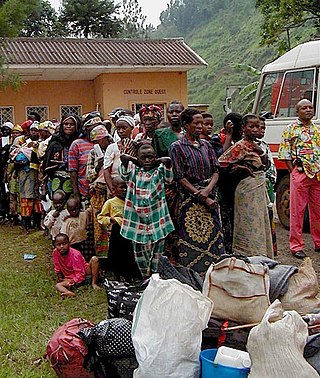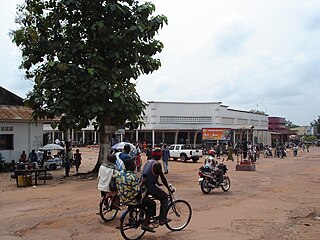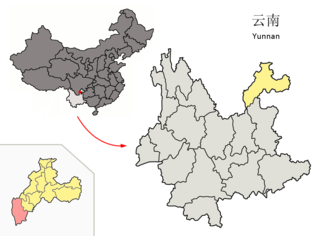
The Democratic Republic of the Congo (DRC), also known as Congo-Kinshasa and formerly known as Zaire, is a country in Central Africa. By land area, the DRC is the second-largest country in Africa and the 11th-largest in the world. With a population of around 112 million, the Democratic Republic of the Congo is the most populous officially Francophone country in the world. The national capital and largest city is Kinshasa, which is also the economic center. The country is bordered by the Republic of the Congo, Central African Republic, South Sudan, Uganda, Rwanda, Burundi, Tanzania, Zambia, Angola, the Cabinda exclave of Angola and the South Atlantic Ocean.

The Air Force of Zimbabwe (AFZ) is the air force of the Zimbabwe Defence Forces. It was known as the Rhodesian Air Force until 1980. The Air Force of Zimbabwe saw service in the Mozambican Civil War in 1985 and the Second Congo War of 1998–2001.

North Kivu is a province bordering Lake Kivu in the eastern Democratic Republic of the Congo. Its capital is Goma.

The Second Congo War, also known as the Great War of Africa or the Great African War, began in the Democratic Republic of the Congo in August 1998, little more than a year after the First Congo War, and involved some of the same issues. Eventually involving belligerents from across the African continent, the war officially ended in July 2003 when the Transitional Government of the Democratic Republic of the Congo took power. Although a peace agreement was signed in 2002, violence has continued in many regions of the country, especially in the east. Hostilities have continued since in the ongoing Lord's Resistance Army insurgency, and the Kivu and Ituri conflicts. Nine African countries and around twenty-five armed groups became involved in the war.

The Rwanda Defence Force is the military of the Republic of Rwanda. The country's armed forces were originally known as the Rwandan Armed Forces (FAR), but following the Rwandan Civil War of 1990–1994 and the Rwandan genocide of 1994 against the Tutsi, the victorious Rwandan Patriotic Front (Inkotanyi) created a new organization and named it the Rwandan Patriotic Army (RPA). Later, it was renamed to its current name.

Mbandaka is a city on the Congo River in the Democratic Republic of Congo located near the confluence of the Congo and Ruki rivers. It is the capital of Équateur Province.
Moanda or Muanda is a town and territory lying on the Atlantic Ocean coast of the Democratic Republic of the Congo at the mouth of the Congo River. It is situated in Kongo Central Province, and has a population of 90,812 as of 2012. The town has an airport and is known for its beaches, and has a few limited tourist facilities, but tourism is incidental to the main economic activities of the town.

Bunia is the capital city of Ituri Province in the Democratic Republic of the Congo (DRC). It was part of the Orientale Province until that province's dissolution.
Ayn al Asad is an Iraqi Armed Forces base located in Al Anbar Governorate of western Iraq. It was originally known as Qadisiyah Airbase.

The Kivu conflict is an umbrella term for a series of protracted armed conflicts in the North Kivu and South Kivu provinces in the eastern Democratic Republic of the Congo which have occurred since the end of the Second Congo War. Including neighboring Ituri province, there are more than 120 different armed groups active in the eastern Democratic Republic of Congo. Currently, some of the most active rebel groups include the Allied Democratic Forces, the Cooperative for the Development of the Congo, the March 23 Movement, and many local Mai Mai militias. In addition to rebel groups and the governmental FARDC troops, a number of national and international organizations have intervened militarily in the conflict, including the United Nations force known as MONUSCO, and an East African Community regional force.

The Republic of the Congo, also known as Congo-Brazzaville, the Congo Republic or simply either Congo or the Congo, is a country located on the western coast of Central Africa to the west of the Congo River. It is bordered to the west by Gabon, to its northwest by Cameroon and its northeast by the Central African Republic, to the southeast by the Democratic Republic of the Congo, to its south by the Angolan exclave of Cabinda and to its southwest by the Atlantic Ocean.

Qiaojia County is a county in the northeast of Yunnan province, China, bordering Sichuan province to the north and west. The population was 625,000 in 2019, 33,200 of whom belonged to ethnic minorities. It is both the southernmost and westernmost county-level division of Zhaotong City and located entirely on the right bank of the Jinsha River. The river valleys of Qiaojia are some of the lowest points in Yunnan province, at around 900 meters. The name of the county literally means 'City of industrious artisans'.

The Simba rebellion, also known as the Orientale revolt, was a regional uprising which took place in the Democratic Republic of the Congo between 1963 and 1965 in the wider context of the Congo Crisis and the Cold War. The rebellion, located in the east of the country, was led by the followers of Patrice Lumumba, who had been ousted from power in 1960 by Joseph Kasa-Vubu and Joseph-Désiré Mobutu and subsequently killed in January 1961 in Katanga. The rebellion was contemporaneous with the Kwilu rebellion led by fellow Lumumbist Pierre Mulele in central Congo.

The M23 rebellion was an armed conflict in North Kivu, Democratic Republic of the Congo (DRC), that occurred between the March 23 Movement and government forces between 4 April 2012 and 7 November 2013. It ended when a peace agreement was made among eleven African nations, and the M23 troops surrendered in Uganda. The rebellion was part of continued fighting in the region after the formal end of the Second Congo War in 2003. The conflict reignited in late 2020 after rebel "general" Sultani Makenga and 100 rebel fighters attacked the border town of Bunagana but failed. A few months later, with a much larger force, the rebels of the M23 movement renewed their attack and captured Bunagana.

The Allied Democratic Forces insurgency is an ongoing conflict waged by the Allied Democratic Forces in Uganda and the Democratic Republic of the Congo, against the governments of those two countries and the MONUSCO. The insurgency began in 1996, intensifying in 2013, resulting in hundreds of deaths. The ADF is known to currently control a number of hidden camps which are home to about 2,000 people; in these camps, the ADF operates as a proto-state with "an internal security service, a prison, health clinics, and an orphanage" as well as schools for boys and girls.
The following lists events that happened during 1998 in the Democratic Republic of the Congo.

The East Aleppo offensive (2017), also referred to as the Dayr Hafir offensive, was an operation launched by the Syrian Army to prevent Turkish-backed rebel forces from advancing deeper into Syria, and also to ultimately capture the ISIL stronghold of Dayr Hafir. Another aim of the operation was to gain control of the water source for Aleppo city, at the Khafsa Water Treatment Plant, in addition to capturing the Jirah Military Airbase. At the same time, the Turkish-backed rebel groups turned towards the east and started launching attacks against the Syrian Democratic Forces, west of Manbij.

The Maskanah Plains offensive was an operation by the Syrian Army against the remaining Islamic State of Iraq and the Levant (ISIL) strongholds in the eastern countryside of the Aleppo Province, with the goal of recapturing the Maskanah Plains from ISIL and advancing into the Raqqa Governorate.
Operation Kitona was a Rwandan/Ugandan offensive that marked the beginning of the Second Congo War. Rwanda hoped to depose Laurent-Désiré Kabila and install a government more favorable to Rwanda's interests by quickly taking control of Kinshasa and the strategic western province of Bas-Congo. On August 4, 1998, joint Rwandan and Ugandan forces launched a surprise attack on Kitona airbase in Western Congo using hijacked civilian airliners. While initially successful in taking control of major ports and infrastructure, Zimbabwean and Angolan intervention prevented the Rwandans and Ugandans from taking control of Kinshasa. The invading forces were forced to withdraw to the jungles of Angola until they were evacuated by air to Rwanda in late 1998.
Ishasha is a town in the Democratic Republic of the Congo (DRC). The town sits across the Ishasha River, which acts as the international border, from the much smaller Ishasha Border Post, in neighboring Uganda. This town has seen much human translocations during the last decade of the 20th century and the first 20 years of the 21 century, as a result of refugees fleeing the two Congo Wars and the associated subsequent armed militia conflicts.














